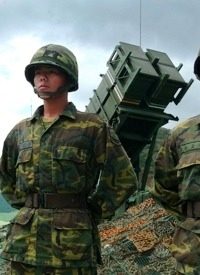
Last month’s decision by the United States to sell $6.4 billion worth of arms and military supplies to Taiwan “will not affect steadily improving ties between Taipei and Beijing,” according to Chiang Pin-kung, Taiwan’s top China negotiator. The deal “should not have any impact on ongoing China talks and the future development of bilateral ties,” he added.
China’s reaction, however, was much less sanguine. Beijing immediately suspended military exchanges with Washington and threatened sanctions against the military contractors supplying the war matériel to Taiwan. And on Monday a group of Chinese military officers, in state-controlled media interviews, urged China to increase its defense spending and deploy additional troops to offset the new agreement between the United States and Taiwan.
Major General Luo Yuan issued a warning that China could attack the United States “by oblique means and stealthy feints. For example, we could sanction them using economic means, such as dumping some U.S. government bonds.” He added:
Our retaliation should not be restricted to merely military matters, and we should adopt a strategic package of counterpunches covering politics, military affairs, diplomacy and economics to treat both the symptoms and root cause of this disease. [Emphasis added.]
Gen. Luo said China needs to change its approach to the United States and more aggressively assert its power: “China’s attitude and actions over U.S. weapons sales to Taiwan will be increasingly tough. That is inevitable with [our] rising national strength.”
Former China specialist for the State Department, John Tkacik, said that China’s Central Military Commission “has the power to order financial measures such as selling U.S. securities,” reflecting the fact that the military is a powerful force in the Chinese communist system, headed up by President Hu Jintao and two key generals. Tklacik added: “The Chinese military now believes that China has tremendous economic and financial leverage … over the United States, and they are giving fair warning…that they will use it.”
If a sufficient quantity of bonds were in fact sold, interest rates could rise significantly and shut down the nascent (and questionable) economic recovery in the United States. Such an economic threat was dismissed by State Department spokesman P. J. Crowley, who said “that would be biting the nose to spite the face.” However, the threats by the Chinese generals reflect the views expressed in Unrestricted Warfare, an obscure book written in 1999 by two political officers in China’s People’s Liberation Army, Senior Colonels Qiao Liang and Wang Xiangsui.
Unrestricted Warfare outlines a strategy of "asymmetrical" or "multidimensional" warfare that extends beyond the mere use of the military on a battlefield to include terrorism, hacking into websites, and targeting financial institutions.
Not that China is ignoring the military component of "unrestricted warfare." According to the Washington Times,
China’s military spending has increased sharply over the past decade as part of China’s semi-secret military buildup that has involved new deployments of advanced ballistic and cruise missiles, large numbers of new warships and submarines, new advanced fighter bombers and various high-tech weapons ranging from computer network attacks and anti-satellite weapons.
In dismissing the threat of financial attacks by China by selling portions of their U.S. government securities, Crowley said, “The economies of the United States and China are intertwined.”
So the “tiff” between China and the United States over military equipment sales to Taiwan reinforce once again the position against “foreign entanglements” expressed repeatedly by our Founding Fathers. Thomas Jefferson said:
I sincerely join… in abjuring all political connection with every foreign power; and though I cordially wish well to the progress of liberty in all nations, and would forever give it the weight of our countenance, yet they are not to be touched without contamination from their other bad principles. Commerce with all nations, alliance with none, should be our motto." –Thomas Jefferson to Thomas Lomax, 1799.
George Washington, in his Farewell Address, iterated the same position:
Why forego the advantages of so peculiar a situation? Why quit our own to stand upon foreign ground? Why, by interweaving our destiny with that of any part of Europe, entangle our peace and prosperity in the toils of European Ambition, Rivalship, Interest, Humour or Caprice? ‘Tis our true policy to steer clear of permanent Alliances, with any portion of the foreign World … I repeat it therefore, Let those engagements be observed in their genuine sense. But in my opinion, it is unnecessary and would be unwise to extend them.
This “tiff’ then is just the tip of the “unnecessary” and “unwise” entanglements iceberg towards which America is headed.
Photo: AP Images



